Before Milosz was born, doctors discovered his heart wasn’t developing correctly. He had a rare combination of four different heart defects, a condition known as tetralogy of Fallot. While serious, it is correctable and at 2 months old, Milosz underwent open-heart surgery at our Herma Heart Institute. Seemingly, that was that. He’d need regular follow-up appointments and monitoring, but everything appeared fixed and taken care of.
That was eight years ago. But little did Milosz’s mom, Joanna, know that his journey was only just beginning, that the after effects of those heart defects — even though they had been successfully repaired — would follow Milosz long after he left the hospital.
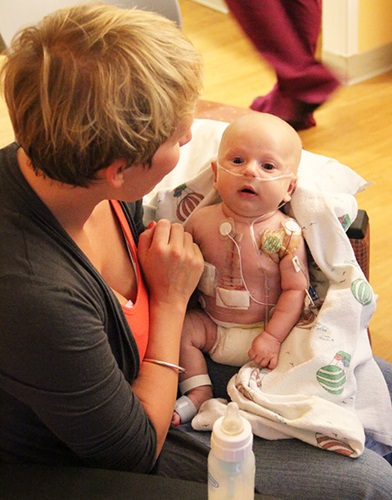 For Milosz, issues began to emerge when he started 4K. Nothing too extreme or troubling, but Milosz was just generally having a difficult time at school. He ended up transferring schools and repeating 4K and the second time around he did great. The new school had smaller classes, a quieter and more nurturing environment and Milosz excelled. His mom figured he just needed time to adjust and mature a bit.
For Milosz, issues began to emerge when he started 4K. Nothing too extreme or troubling, but Milosz was just generally having a difficult time at school. He ended up transferring schools and repeating 4K and the second time around he did great. The new school had smaller classes, a quieter and more nurturing environment and Milosz excelled. His mom figured he just needed time to adjust and mature a bit.
But when the fall of 2017 rolled around and Milosz again changed schools for 5K — this time to Waukesha STEM Academy: Randall Campus — the behavioral issues that had plagued him during that first year of 4K returned with greater intensity. Milosz was having near-daily emotional outbursts, anger management issues, struggling to connect with his peers and showing signs of depression — every day was a constant struggle. Joanna worked with the school, the special education teacher and psychologist, they developed an Individualized Education Plan (IEP), but nothing worked.
“Before, he loved school, he loved to learn, he loved to be in a classroom,” said Joanna. “I remember thinking he must have a brain tumor or something that was effecting his behavior. I couldn’t recognize him.”
In the spring of 2018, Joanna was at a biannual parent education event held by our Herma Heart Institute and she saw a presentation by Kyle Landry, manager of the Educational Achievement Partnership Program at Children’s Wisconsin. Kyle was talking about child development, neurodevelopment and the challenges heart kids face that go beyond their physical heart issues.
1
“It’s important to draw the connection between heart defects and neurodevelopmental delays,” said Kyle. “When a baby has a heart defect, they have oxygen- depleted blood circulating through their body. So the brain is receiving limited oxygen, which affects so many other areas of the child’s development.”
“My eyes completely opened,” said Joanna. “I talked to her afterwards and decided to enroll Milosz.”
Breaking down barriers
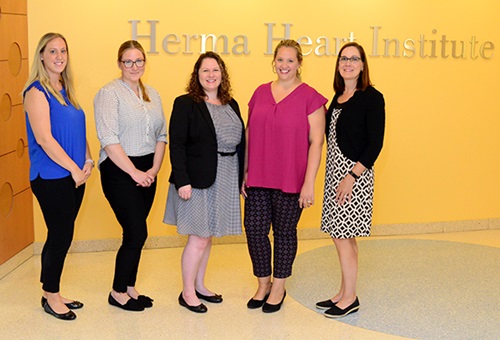 The Educational Achievement Partnership Program (formerly the School Intervention Program) serves as a communication hub and links the family, the school, the hospital and the community agencies together. Every child enrolled in the program is assigned a school intervention specialist who collaborates with the school in order to boost academic success, motivation, attendance, attention, behavior and social-emotional functioning.
The Educational Achievement Partnership Program (formerly the School Intervention Program) serves as a communication hub and links the family, the school, the hospital and the community agencies together. Every child enrolled in the program is assigned a school intervention specialist who collaborates with the school in order to boost academic success, motivation, attendance, attention, behavior and social-emotional functioning.
“Instead of adding school liaison responsibilities to current staff members, our unique approach places a full-time educational specialist with in-depth knowledge of the child’s medical, surgical, development and educational histories at the center of a multidisciplinary care team,” said Kyle. “This helps ensure information is communicated clearly and consistently among all stakeholders involved in the child’s care.”
Cheryl Brosig, PhD, a psychologist within the Herma Heart Institute, serves as medical director for the Educational Achievement Partnership Program. The program was born out of the Developmental Follow-Up Program she and her team started in 2007.
“Numerous research studies demonstrated the connection between heart defects and neurodevelopmental delays, but cardiac programs were not addressing these problems,” said Dr. Brosig. “We felt we just needed to do something. The Herma Heart Institute was the first program in the country to have this systematic developmental follow-up as part of standard cardiac care.”
Dr. Brosig and the Developmental Follow-Up Program team identified gaps and limitations for children with cardiac conditions. They learned that unlike children with obvious disabilities, children with an “invisible condition” are at a tremendous disadvantage in the classroom. Many of these children experience delays in subtle ways: fine and gross motor limitations, speech and language delays, or emotional concerns such as anxiety or depression.
Because of privacy laws, the Developmental Follow-Up Program team wasn’t always able to communicate directly with the patients’ schools. They would complete comprehensive evaluations and write a detailed report and it was the family’s job to take those recommendations back to schools. For a variety of reasons, that didn’t always happen.
Dr. Brosig discovered that while families of children with complex health needs generally have strong advocacy skills, they are often ill-equipped to communicate those needs in a way schools can understand and act upon.
“My husband and I feel like we are good advocates for our Milosz but we’re not doctors or nurses, so it’s so important for us to have that person who can back us up,” said Joanna.
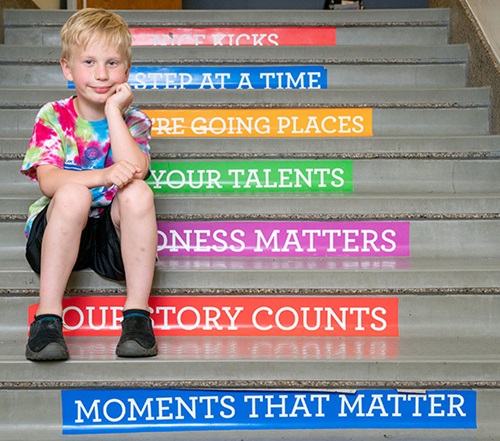 Often, parents’ concerns were dismissed. They were told, “Not all children develop at the same pace” or, “They will grow out of it as they mature.” These are perspectives educational professionals have been taught since the earliest days of their teacher education programs. But now, with increasing survival rates for kids with congenital heart defects, there are new development needs that educators didn’t encounter before.
Often, parents’ concerns were dismissed. They were told, “Not all children develop at the same pace” or, “They will grow out of it as they mature.” These are perspectives educational professionals have been taught since the earliest days of their teacher education programs. But now, with increasing survival rates for kids with congenital heart defects, there are new development needs that educators didn’t encounter before.
As recently as 10 or 20 years ago, kids like Milosz likely wouldn’t have survived long enough to make it into the classroom. Thanks to major medical advancements, however, children with congenital heart defects are living well into adulthood where before they rarely made it out of the hospital. Now, this new group of survivors are making their way into the classroom and teachers aren’t equipped with the tools to support them.
“There were a lot of barriers to the school and medical team communicating easily with each other. We found that school personnel and medical providers don’t necessarily speak the same language when it comes to what the child needs. And a lot of families just had no idea how to advocate on behalf of their child,” said Dr. Brosig. “So, we came up with this idea to have a person who had knowledge of both the educational and medical system to serve as a liaison between the family, the school and the medical team to help bridge that gap.”
Kyle was hired in 2015 to make this vision a reality. Above all else, the Educational Achievement Partnership Program is about communication, education and advocacy for children with complex health needs.
2
The ultimate goal is to break down barriers to ensure this new community of congenital heart disease survivors gets the help they need.
“Unlike medical conditions that are physical and diagnosed and treated by medical specialists, neurodevelopmental deficits fall into a gray area,” said Kyle. “The purpose of our intervention is to find out what the schools know and don’t know so that we can fill in the missing gaps and get them the information they need to properly support the child educationally. It’s not a test or a critique. It’s ‘How can we help you?’”
Bigger needs uncovered
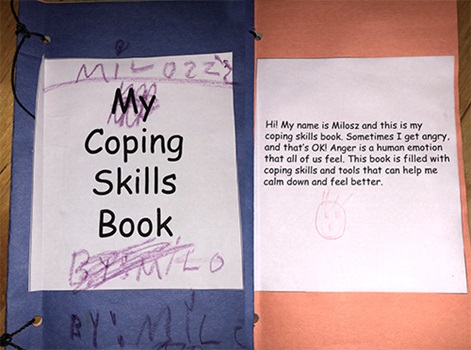 Joanna came to the Educational Achievement Partnership Program because of Milosz’ behavioral issues. But she — like many other parents — was surprised to learn what the team uncovered. After interviews with Milosz as well as with his mom, his teacher and his doctors, Christie Ruehl, a program coordinator for the Educational Achievement Partnership Program, identified a number of issues that needed to be addressed.
Joanna came to the Educational Achievement Partnership Program because of Milosz’ behavioral issues. But she — like many other parents — was surprised to learn what the team uncovered. After interviews with Milosz as well as with his mom, his teacher and his doctors, Christie Ruehl, a program coordinator for the Educational Achievement Partnership Program, identified a number of issues that needed to be addressed.
“Most hospital-based school liaison services address concerns that parents identify. But our program takes a comprehensive approach,” said Christie. “We look at 18 different domains of school functioning and we ask every parent every question. A lot of times, we uncover far more needs than the parents originally thought.”
“When your kid is struggling like this, you feel like you failed as a parent. You look back and think, ‘What did I do wrong…maybe I should have done this,’” said Joanna. “Just to have Christie and the team reassure us that this is because of the trauma he went through as an infant, because of the surgery, because of the anesthesia, because of his heart not developing correctly in the first place and affecting the brain, it was really nice to know that this is not my fault.”
In addition to that relief, Joanna also has a team of people to support Milosz’s needs.
Armed with a strong understanding of Milosz’s strengths, challenges, and future goals in the classroom, Christie sent her findings and recommendations to his school. As is typical of the schools the Educational Achievement Partnership Program partners with, they were incredibly receptive to everything.
“He’s in a great school and they support him very much,” said Joanna. “Everything Christie asked them to do, they did. We’re very fortunate to have that support for Milosz.”
With the additional information, Christie set up a meeting with the special education teacher and the district nurse and suggested some strategies to improve his IEP and get him more resources. Additionally, the district nurse used the cardiac symptom management guidelines Christie provided to create a school health plan for Milosz, which is important and something all students with cardiac conditions should have, but often do not.
As Milosz continued 1st grade, he now had an arsenal of tools and techniques that were tailored specifically to his unique needs. He had a full team behind him — supporting him, caring for him, rooting for him.
“He has the resources he needs to be successful,” said Joanna. “He’s so proud of himself.”
The gold standard
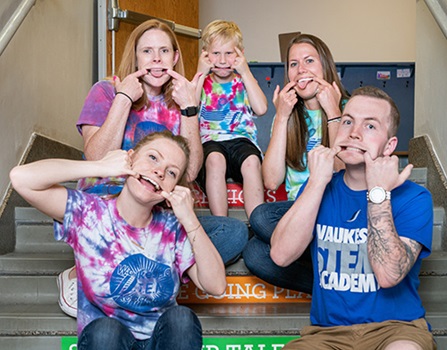 After initial school meetings in September and October 2018, Christie had follow up meetings with Milosz, his family and his teachers in December, January and then again at the end of the school year to monitor Milosz’s progress and adjust his supports as needed. But every kid is unique. Some require multiple follow-ups throughout the year while some do the initial intervention and don’t meet again until their annual review. However, when kids change schools or get new teachers, the process starts over again.
After initial school meetings in September and October 2018, Christie had follow up meetings with Milosz, his family and his teachers in December, January and then again at the end of the school year to monitor Milosz’s progress and adjust his supports as needed. But every kid is unique. Some require multiple follow-ups throughout the year while some do the initial intervention and don’t meet again until their annual review. However, when kids change schools or get new teachers, the process starts over again.
“We’ll interview the new teacher and the new school nurse, and we’ll go back to the schools and do the presentations from scratch,” said Kyle. “It’s important that everyone working with the child has all the information necessary to keep the child healthy and safe at school and to understand their unique learning needs.”
With a background in education — she was a teacher with Milwaukee Public Schools for five years — Kyle is uniquely suited to bring that school perspective to the medical team. She understands how important it is for everyone to be on the same page.
“Most schools don’t recognize how their limited medical knowledge negatively impacts learning opportunities,” said Kyle. “The reality of this gap between medical and educational teams shows just how urgent the need for improved care coordination is.”
The growth of the Educational Achievement Partnership Program shows how urgent the need is, too. In the program’s first year, there were only 12 kids and it was limited to school-aged heart transplant patients. The second year, it grew to 42 kids. Today, just four years later, the program serves more than 350 kids from the Herma Heart Institute, from day care through college. Looking ahead, there are plans to expand the program to other areas of Children’s Wisconsin. The Educational Achievement Partnership Program recognizes that outside of heart diseases there are a lot of kids with complex medical needs who would greatly benefit from these types of services.
“This innovative program has the potential to create a gold standard of pediatric follow-up care for the millions of children across the country with complex medical conditions,” said Kyle.
Perhaps most importantly, these services come at no cost to the families. Our philanthropic partners empower the Herma Heart Institute to continually move the needle in research, clinical care, and outreach so that kids thrive and reach their fullest potential. Services like the Educational Achievement Partnership Program would not be possible without the generous support of our donors.
Today, as Milosz prepares to start 2nd grade, he has all the tools he needs to be successful — academically, socially, behaviorally and medically. That’s his reality now and there’s no telling where he’d be without the Educational Achievement Partnership Program.
“Before, every morning he was angry and sad about going to school. He was anticipating problems. He knew he was going to have a bad day,” said Joanna. “But now he’s excited to go. He’s like a different boy. Everything is better.”







